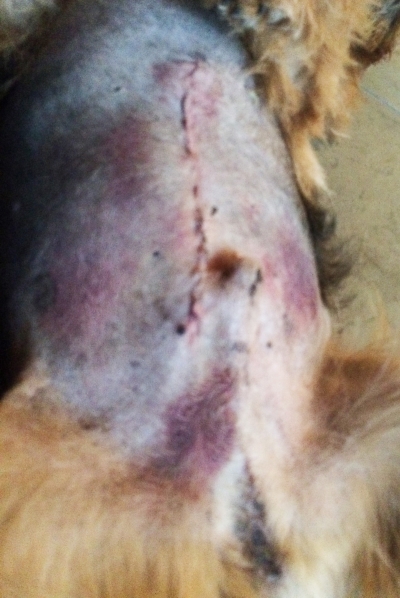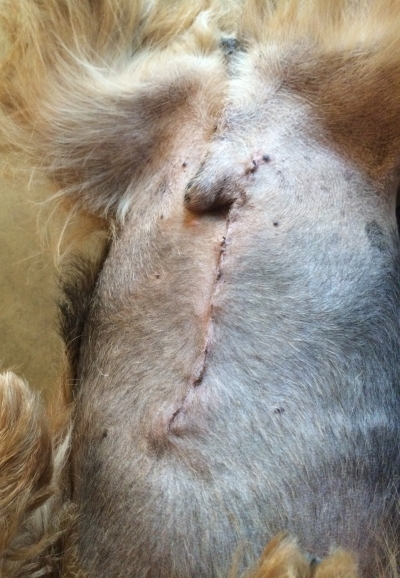The very next day after getting the call from Dr. Langenbach to tell us that Otto had hemangiosarcoma, we jumped into action.
After rolling out of bed on Wednesday (12/17/14), we made an appointment with Dr. Elsa Beck, an oncologist at the Hope Center. She was able to squeeze Otto in that same day. We weren’t about to let Otto face this alone, so we all headed out to her office in Vienna, VA.
Dr. Beck talked about Otto’s cancer and the various treatment options. The bad news is that treatment options don’t offer hope of eliminating the cancer. Most dogs with hemangiosarcoma die in a few months. Typically, the disease is discovered at a crisis point, and a dog at that weak state struggles to get through surgery, if it is attempted at all. Many opt not to do surgery because the prognosis is so poor. Fortunately for Otto, he came through the surgery with flying colors, and his blood levels were back to normal in under 1 week.
She said treating the disease involves 2 things:
- reducing the bleeding risk
- slowing or stopping the tumor growth
Time to pop some pills!
Reducing the Bleeding Risk In Dogs With Hemangiosarcoma
Like other dogs, Otto’s cancer diagnosis came because he had an emergency with internal bleeding. Any one of these bleeding emergencies could prove fatal, so reducing the risk of internal bleeding is a top priority.
Reducing bleeding risk is done by taking Yunnan Baiyao, a herb used by the Viet Cong in the Vietnam War to stop bleeding. It’s available in capsule form.
Dr. Beck was able to dispense some of this for Otto, and we went ahead and picked up additional supplies of Yunnan Baiyao from the Modern Herb Shop. Otto takes two 250 mg capsules a day. At about $8 for 16 capsules, that works out to about $1 per day. Each package also comes with a very small red pill that is a fast acting way to stop blood loss in a crunch. We keep 1 of those nearby when we’re out on the trails.
Is Yunnan Baiyao effective? You bet it is! Here’s a pic of Otto on 12/16, 5 days after his surgery on 12/11 and before taking any Yunnan Baiyao. There’s less bruising than before surgery, but he’s still got stains from the internal bleeding.
And here’s a pic of Otto on 12/20, after taking Yunnan Baiyao for 3 days:
Bruising all gone!
Slowing or Stopping Hemangiosarcoma Tumor Growth
Dr. Beck explained that there are a couple of options for trying to slow or stop hemangiosarcoma tumor growth. There aren’t great options, so you work with what you’ve got and keep searching for something better. For Otto, there are really 3 options:
- polysaccharopeptide (PSP) derived from the Coriolus versicolor mushroom, aka Yun Zhi mushroom
- chemotherapy to kill existing cancer cells
- agents to slow cancer cell growth
When Otto heard mushrooms, he connected that to food. His ears perked up, so at least we wouldn’t have to fight to get him to take this.
Yun Zhi Mushrooms
I know it might sound a little far out, but Dr. Beck said that Yun Zi mushrooms just might be the best treatment for Otto’s cancer. A 2012 effort to organize and analyze a number of studies found “strong evidence that Yun Zhi would have survival benefit in cancer patients….”
Dorothy Cimino Brown and Jennifer Reetz from the University of Pennsylvania published a study on using PSP derived from Yun Zhi mushrooms to treat hemangiosarcoma in dogs. In the press release for the study, Dr. Brown said:
We were shocked. Prior to this, the longest reported median survival time of dogs with hemangiosarcoma of the spleen that underwent no further treatment was 86 days. We had dogs that lived beyond a year with nothing other than this mushroom as treatment.
One big finding:
It is noteworthy that the median survival time for dogs in the 100 mg/kg/day treatment group (199 days) was longer than that which is reported for dogs receiving doxorubicin based chemotherapeutic protocols (141 to 179 days). Based on this data, one could hypothesize that PSP has the potential to have effects on survival similar to that which is seen with standard of care chemotherapy.
PSP derived from Yun Zhi mushrooms is sold as I’m-Yunity in 400 mg capsules. For dogs, the recommended daily dosage is about 100 mg for every 1 kg of body weight, which means a dog needs to get 1 capsule for every 8.8 pounds of body weight per day. Otto needs to take 2 capsules every day. A 60 capsule supply costs about $100, so that puts the daily cost at about $3.33.
Hopefully, Otto likes these mushrooms, because it looks like he’s going to be gobbling up a lot of them.
Chemotherapy To Kill Cancer Cells
Dr. Beck said the most common chemotherapy agent for Otto’s cancer is doxorubicin, or Adriamycin. It’s an intravenous treatment that causes us to take a road trip to Dr. Beck’s office every 3 weeks. It’s a very involved process, because Otto has to have his heart and blood checked to make sure he’s healthy enough to receive the treatment.
Otto got his first doxorubicin treatment on 12/31/14. He said going to the doctor’s office on New Year’s Eve forced him to get on the road early, so he’d make his party plans with time to spare. He had no downtime whatsoever as a result of getting chemotherapy, which was a nice plus. It just makes it harder when the drugs to help you create problems of their own.
Agents To Slow Cancer Cell Growth
In addition to doxorubicin, Dr. Beck also said Otto should take Masitinib to try to slow the growth of cancer cells. He takes a dose of 50 and 100 mg, alternating every day. It’s a strange drug, because you have to wear gloves so you don’t touch it. If you’ve ever looked for medical gloves for our small paws, you’ll discover those aren’t the easiest things to come by.
One side effect of Masitinib is that can affect the regeneration of healthy cells in Otto’s stomach that might naturally die off in the digestive process. To get around that, Otto takes Pepcid (10 mg per day).
Wow, That’s a Lot of Drugs
When you sit down and list everything out, Otto takes a lot of drugs every day:
- 2 X 250 mg Yunnan Baiyao
- 2 x 400 mg I’m-Yunity
- 50 or 100 mg Masitinib
- 10 mg Pepcid
Getting us dogs to take some of these big capsules could be a real challenge, but Otto devours them readily if they’re presented with food. The downside is there’s been some weight gain, but that just means we have to head off to the gym.
Fortunately, Otto takes all of this in stride and hasn’t shown any side effects from the drugs. We hope they’re doing him some good.
Yesterday, Dr. Beck planned to give Otto his second dose of doxorubicin (1/22/15 or 3 weeks after his first dose), but he had some bronchitis so that got postponed until next week. Another road trip!


Any updates on Otto who was diagnosed with Hermangiosarcoma post-surgery and various holistic treatments? I have a dog, Lokai, who is as we speak undergoing a splenectomy and am gathering info for our next step. Please let me know how successful was Otto’s follow-up treatment plan. Thanks. Bev Schmidt
My dog was recently diagnosed with the same type of cancer in her abdomen. Would really like to know the end results and how everything went with treatment and how much longer Otto was able to survive…
JJ – Sorry that your dog got this bad news. You can find more links about Otto at this link: https://www.norfolkterriertales.com/about/otto/ and for links about his cancer treatment see https://www.norfolkterriertales.com/tag/otto-and-cancer/ .
Otto was diagnosed at the end of 2014, and he passed on 9/1/15. We miss him every day.
Hemangiosarcoma can be a fast-spreading cancer. Hopefully, you get more time with your dog.